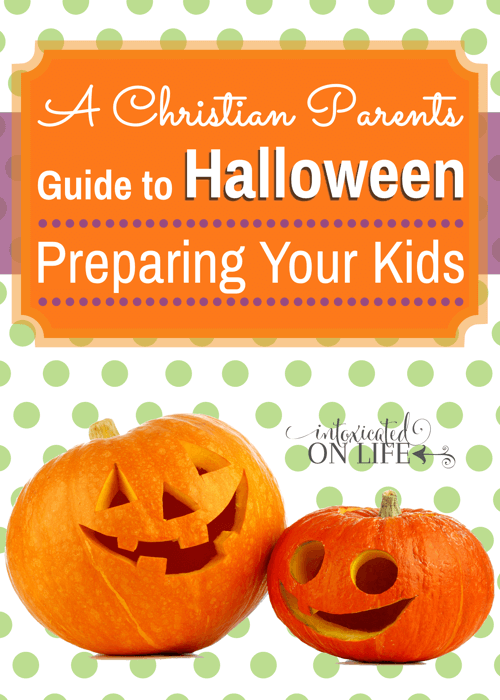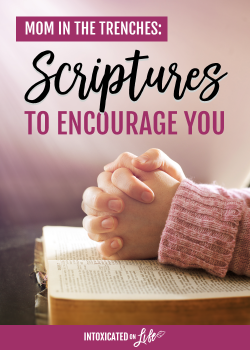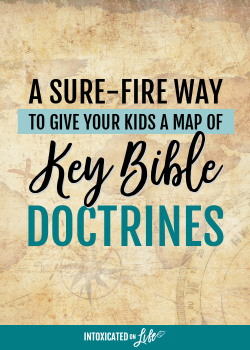Many Christian parents I know would like to obliterate Halloween from the cultural calendar. In their minds, it is a day consumed with darkness and evil. So last year when I wrote an article about redeeming Halloween, I was not surprised when I was met with a litany of protests. (If you don’t remember the article or didn’t read it, I recommend you go there first.)
Some believe there is nothing redeemable about Halloween—it is demonic to the core. While Halloween is one of those cultural celebrations that is often used to glorify darkness and evil, I believe there are many elements within it that can be redeemed and reclaimed by the church and used for the glory of God.

In my next post, I’m going to offer ideas for enjoying the day of Halloween itself. In this post, I’m going to offer two suggestions to parents about how you and your household can build up to Halloween.
1. Teach your kids about “holy horror.”
Much of today’s Halloween celebrations are a glorification of not just violence, gore, and lust, but a glorification of that which is openly demonic. Christians should refrain from all appearance of evil in the way they decorate their bodies and their homes. But with the culture’s emphasis on all that is dark, sinister, and undead, it affords parents the perfect opportunity to reclaim the genre of horror for their children.
God uses horror in the Bible to grab our attention and show us the true nature of evil. Don’t believe me? Take a closer look at books like Daniel or Revelation. These books are filled with gore, carnivorous monsters, and apocalyptic destruction. Don’t think that counts as horror? I dare you to turn out the lights and read a chapter or two to your kids right before they fall asleep in your best foreboding voice.
Why did God inspire such stories? Why did God use the popular apocalyptic genre, filled with bizarre and hideous forms of evil, to make his point? First, because it is a memorable way to show the true face of evil. Even in our own culture, classic ghost or monster tales are written to serve as a picture of the depravity of human beings, the beast within us all. Second, because these stories show the true results of evil. Horror reminds us that evil ultimately leads to chaos, death, and the total unraveling of society.
Brian Godawa, author of Hollywood Worldviews, puts it well when he says that this is the virtue of horror:
The portrayal of good and evil, as well as their consequences, are two sides of God’s one honorable, pure, lovely, excellent, and praiseworthy truth. According to the Bible, pointing out wrong is part of dwelling on what is right, exposing lies is part of dwelling on the truth, revealing cowardice is part of dwelling on the honorable, and uncovering corruption is part of dwelling on the pure.
How we reclaim horror for our children will depend on their age and maturity, but here are some places to start:
Read aloud some of the apocalyptic portions of the Bible and spend time discussing them.
If your kids take the symbols literally and are somewhat confused by them, this isn’t a problem. At a young age, they don’t need to know why the leopard has four heads or what every horn on the beast stands for—it is enough to know that monsters are scary and we want someone to slay them. Then when Jesus comes riding in on white horse to save the day, this emotion will stick with them. These stories are meant to grab us emotionally before we grasp them intellectually.
As G.K. Chesterton said, “Fairy tales are more than true—not because they tell us dragons exist, but because they tell us dragons can be beaten.”
Help your children see how classical archetypes of evil (monsters, dragons, vampires, werewolves, ghosts, etc.) show the true nature of sin and evil.
Your children will likely see all manner of strange creatures as Halloween approaches (in costumes or decorations), so give them a context for where these creatures come from and how they help us to understand ourselves and our world. For younger kids, it is enough to say that scary creatures show us what real evil looks like: sin might look attractive on the surface, but underneath, sin is hideous.
For older kids, you can get into specifics.
- Vampire stories often symbolize the the thirst and restlessness of our repressed dark side, an addictive madness that is so strong we believe it will follow us even beyond death.
- Dr. Jekkyl and Mr. Hyde symbolize the dual nature of humanity and the futility of trying to manage or quarantine one’s sinful impulses.
- Zombies are the true apocalyptic monster, the symbol of animalistic human nature that is left when society breaks down.
- Frankenstein’s monster is symbolic of scientific pride of the Enlightenment, the belief that through science man can be his own god, his own maker, because man is ultimately reducible to mere biology—a belief that ultimately leads to destruction.
When our kids know something about the significance of these monsters, they become neither things we “celebrate” nor things we shun outright—rather, they become windows to see how evil works.
Knowing these things allows Christian families to even appreciate well-written horror and scary tales from great authors like Edgar Allen Poe, Washington Irving, Mary Shelley, Henry James, W.W. Jacobs, and H.P. Lovecraft. These great authors used horror to explore important themes like original sin, the downfalls of modern society, and the persistence of sin even beyond death.
Spend time in the Scriptures teaching your kids about the demonic.
Children need to know that evil is not just an abstraction—there is a personal evil in the world that is bent on killing, stealing, and destroying. As Halloween approaches, the atmosphere of the holiday is a perfect time to capture this reality. The point is not to look down on those who wander the streets as ghostly creatures, but to use your environment as a living parable, a reminder that real demons are just as real and even scarier than the trick-or-treaters. Spend time reading the stories in the gospels of deliverance from demonic spirits.
Christian families who understand these things can actually enjoy Halloween, not because they are reveling in evil but because the holiday serves as a powerful reminder of the true nature of evil and a joyful reminder that Christ has conquered the devil.
2. Teach your kids about the saints who’ve come before us.
Before it was called Halloween it was called All Hallow’ (Saints’) Eve, and before this it was called “the Feast of All Martyrs.” This church holiday was traditionally held on the first Sunday after Pentecost. On the heals of a great season of celebrating Jesus’ resurrection and enthronement in heaven, the church in the fourth century set aside a special day to honor the martyrs who had given their lives for Christ. The original spirit of the church holiday was to remember the faithful saints who came before us.
Leading up to Halloween, spend the month of October reading about the lives of your favorite saints. Perhaps you start in Hebrews 11, reading about the “great cloud of witnesses” (Hebrews 12:1) that surround us, the men and women who faithfully served God. Perhaps you move to some of your favorite Christians in the Bible, reading about their adventures. Then perhaps you move to the stories of Christian martyrs, church fathers, and famous missionaries.
Here are some books you can use to do that:
- God’s Missionary: The Faith of Thomas
- Polycarp of Smyrna
- Ignatius of Antioch
- Jesus Freaks: Martyrs – Stories of Those Who Stood for Jesus
- The Story of St. Valentine: More Than Cards and Candied Hearts
- The Story of St. Nicholas: More Than Reindeer and a Red Suit
- The Story of St. Patrick: More Than Shamrocks and Leprechauns
- Ten Boys Who Didn’t Give In: Inspiring Stories of Martyrs
- Ten Girls Who Didn’t Give In: Inspiring Stories of Martyrs
- Athanasius
- Augustine of Hippo
- Anselm of Canterbury
- Reformation Heroes
- God’s Outlaw: The Real Story of William Tyndale and the English Bible
- Martin Luther: A Man Who Changed the World
- John Knox
- John Calvin
- John Owen
- Lady Jane Grey
Remind your kids this is what “Halloween” means: the eve of All Hallows’ (Saints) Day. Build up to that day by inspiring your family with stories of faithfulness and sacrifice.










Wow this was an excellent article! I especially like the in-depth section about vampires,zombies, frankenstein etc. I certainly agree we need to redeem the time and also make Halloween a fun but serious time of teaching.
From what I hear Halloween is becoming just as lucrative as Christmas in the last few years. More people would rather celebrate Halloween than Christmas in the states. Alarming, but it shows us we need to be creative and redeem it! Great article!
Thanks, Kris!
thanks.. I will re read this more in depth at bed time tonight. I am against Halloween but my 5 yo girl likes to wear costumes…I will read this and share what I find out. I have seriously been praying about this issue since september. Also this may help with the hocu pocu she sees on tv cartoons and likes to mimic.
Thanks, Lynn. My previous article on Halloween (read it here) also might be a big help with this question.
Very interesting! i have an almost 3-year old girl, and I can tell she’s noticing the creepy decorations at stores this year. I’ve been wondering how to approach it. This gives me some great ideas. Thanks a lot! Glad to have found this through the Mama Moments Monday link up!
Erin
http://www.itallmattersmom.com
Thanks, Erin. I’m glad this helps.
Bravo, bravo, bravo and God bless you for having the courage to speak up and out the Truth in His Name! As a horror author who is a Christian, I understand the derision heaped on Christians who don’t think horror in and of itself is demonic. In addition to the passages you mention, I would also take a hard look at the Bible’s own horror story — Mark 5:1-20, the Gadarene demoniac. That’s the stuff of nightmares, as creepy and unnerving as anything you’ll read from the horror masters you cite, and yet it ends with the Power and Glory of God as Jesus crushed the devil’s head by breaking his hold on that region and banishing his vile servants. Thank you again for being a voice of sanity and biblical truth!
Thanks for reading, HG. I agree. I zeroed in on Daniel and Revelation specifically because they are purposefully using fictitious monsters to speak of spiritual and political realities, much the same way classic horror monsters do. As another kind of example we have historical accounts that can be considered a kind of horror—such as the episode you mentioned about Jesus and the demoniac. This corresponds to horror stories emphasize reality, all the way from serial killer plots to demonic plots. All of these kinds of horror can serve a good purpose, especially if they are well-written and don’t major on trivial ideas. It is great you are using your talents in this area for God’s glory.
Very interesting viewpoint. I myself used to love Halloween but after i was saved it no longer felt right in my heart. While God does call certain people to refrain from certain thing specific to them I am not sure Halloween is one of them. I think there is way too much pressure on families to celebrate and participate in what the world says we should and there is certainly a pattern to what they say we should. It is becoming more and more dark and borderlining. Most families do not celebrate Ramadan but yet we are not told that our children are missing out on their childhood because of that. I am not disagreeing with what you are trying to say but I think it needs to be pointed out that maybe there is a reason we as Christians have this internal struggle with this particular holiday, because I do not know one Christian family that does not struggle with this “Halloween thing” I am definitely one of them! I think this is just something we as parents and as Christians just need to really pray about. Great article though it is defiently something to look into and pray on.
Thanks for your thoughts. I do believe this is a matter of conscience, and it is best not to violate your conscience.
That said, I think our consciences need to be biblically informed. I’ve not “struggled” with Halloween on a personal level, and only when I started having kids did it cross my mind. As I said in my first post about redeeming Halloween, I see modern Halloween as a mockery of ancient paganism, not an endorsement of it. When children are taught about the history of All Hallows’ Eve (which is, after all, a church-created holiday), it teaches them to see that Halloween can be a great time to remember Jesus’ victory over darkness.
I can say to my kids, “You know, ages ago people used this night making offerings to the departed spirits and fairies. They would engage in divining rituals. Druids would try to make contact with the dead. But later the church moved All Saints’ Day to October 31 and over time the whole point of the holiday was to remember the faithful saints who have come before us. When kids would dress up as sinister creatures, it was to mock the darkness, not rejoice in it. Today, we can enjoy All Saints’ Eve remembering that Jesus has disarmed the spiritual rulers and authorities, putting them to open shame by His cross.”
I would just like to thank you for writing this, my fiance and I really enjoyed reading this and screaming with laughter right before we watched horror movies and had pre-marital sex! I cant wait for your kids to go to school with my kids so that we can corrupt them for you.
Kisses!
<3
If there’s something specific you find humorous about the article, I’d love to know what it is.
I guess since my kids are homeschooled they won’t have the pleasure of being introduced to your kids. Such a shame.